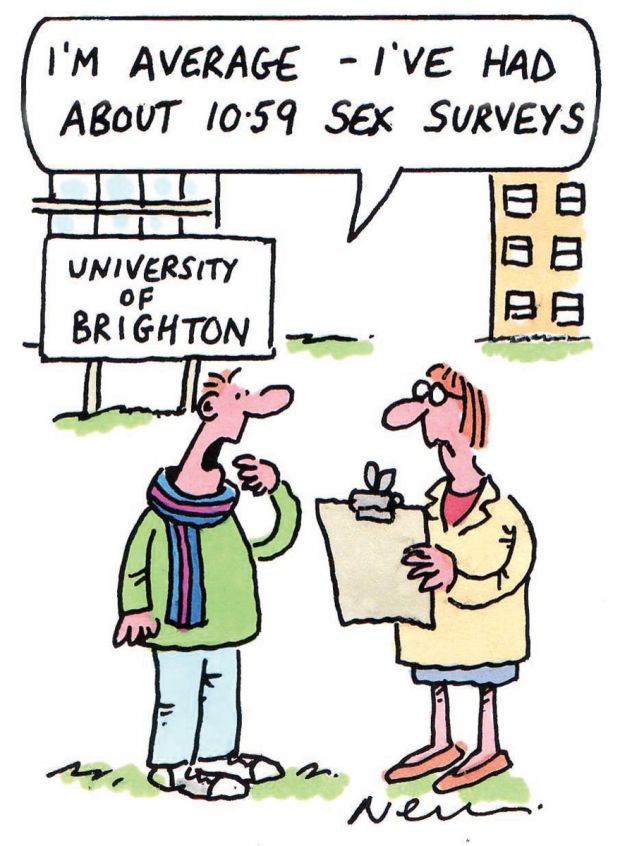
- Students at the University of Brighton are the most likely to score between the sheets, according to higher education’s most salacious – and least reliable – league table. Brighton undergraduates had an average of 10.59 sexual partners during their time at university – a figure that must push the bounds of credibility. That helped the South Coast institution to top the annual Student Beans survey, which polled about 6,000 students at more than 100 universities. Bath Spa University and the University of the West of Scotland were at the bottom of the bed-hopping charts published on 21 May. But generally it seems that bedroom shenanigans are on the rise on campus. Perhaps the increase from an average of 3.68 sexual partners during a degree in 2013 to 4.88 this year indicates a return to the friskier levels seen before £9,000 fees came in.
- A University of Cambridge academic and Labour council candidate blamed a housemate for a tweet sent from his account that described a 79-year-old woman as “gaga” and questioned if she were alive. Peter Sarris was branded a “disgrace” in the run-up to the local elections after a tweet to a rival Liberal Democrat candidate said: “Is that Shirley in your leaflet actually alive? Seems a bit gaga.” The tweet referred to pensioner Shirley Fieldhouse, whose photograph appeared on a Lib Dem campaign leaflet, the Cambridge News reported on 21 May. Dr Sarris, a reader in late Roman, medieval and Byzantine history and fellow of Trinity College, claimed that his Twitter account had been hacked, “later clarifying that a housemate had used his account”. Ms Fieldhouse, a retired personal assistant in the University of Cambridge’s physics department and treasurer of the Unitarian Church, said wisely: “One has to be very careful what one puts out on the internet, but I think sometimes people are very careless.” Happily for Dr Sarris, he was still elected to the council.
- Kinki University in Japan is to change its name to avoid jokes about its “perverted” connotations. From 2016 it will adopt the name Kindai University, the BBC News website reported on 22 May. “The word ‘kinky’ also means perverted. We have no other choice than changing the English name because we are serious about pursuing a more international school culture,” Hitoshi Shiozaki, the university’s dean, told the AFP news agency. If the potential for mild innuendo is reason enough for universities to change their names, England’s Bishop Grosseteste University has some serious thinking to do.
- Classmates of the daughter of Australian Prime Minister Tony Abbott have questioned how she managed to win a A$60,000 (£33,000) scholarship that was not advertised to other students. Frances Abbott received the “chairman’s scholarship” to cover her tuition fees at the Whitehouse Institute of Design in Sydney owing to her “academic potential”, Mr Abbott told The Guardian on 23 May. But Ms Abbott’s Whitehouse classmates claim they knew nothing about the scholarship, awarded only once in the past 25 years. They had clearly not chatted to the institute’s chair of governors, Les Taylor, a long-time friend of Mr Abbott and Liberal donor, who admitted he had “put her name forward” for the award. The news of Ms Abbott’s controversial windfall came as Mr Abbott faced student protests over plans to uncap tuition fees.
- Archivists from the Glasgow School of Art have begun an operation to conserve items damaged by the fire that ripped through the Charles Rennie Mackintosh-designed building on 23 May. The salvage effort will also retrieve the work of students who were preparing for their final-year degree show, The Guardian reported on 26 May. The building is among Scotland’s most precious and is regarded as one of the world’s greatest examples of Art Nouveau. Muriel Gray, chair of the school’s board of governors, revealed that firefighters succeeded in protecting a large portion of the building by forming a “human wall” up the main staircase. “After ensuring that no lives were in peril, they displayed an impressive understanding of the precious nature of the building, and due to their careful and meticulous handling of each developing situation, the damage is considerably less than we dreaded,” she said.
Register to continue
Why register?
- Registration is free and only takes a moment
- Once registered, you can read 3 articles a month
- Sign up for our newsletter
Subscribe
Or subscribe for unlimited access to:
- Unlimited access to news, views, insights & reviews
- Digital editions
- Digital access to THE’s university and college rankings analysis
Already registered or a current subscriber? Login
